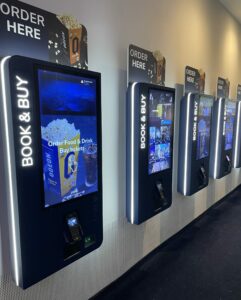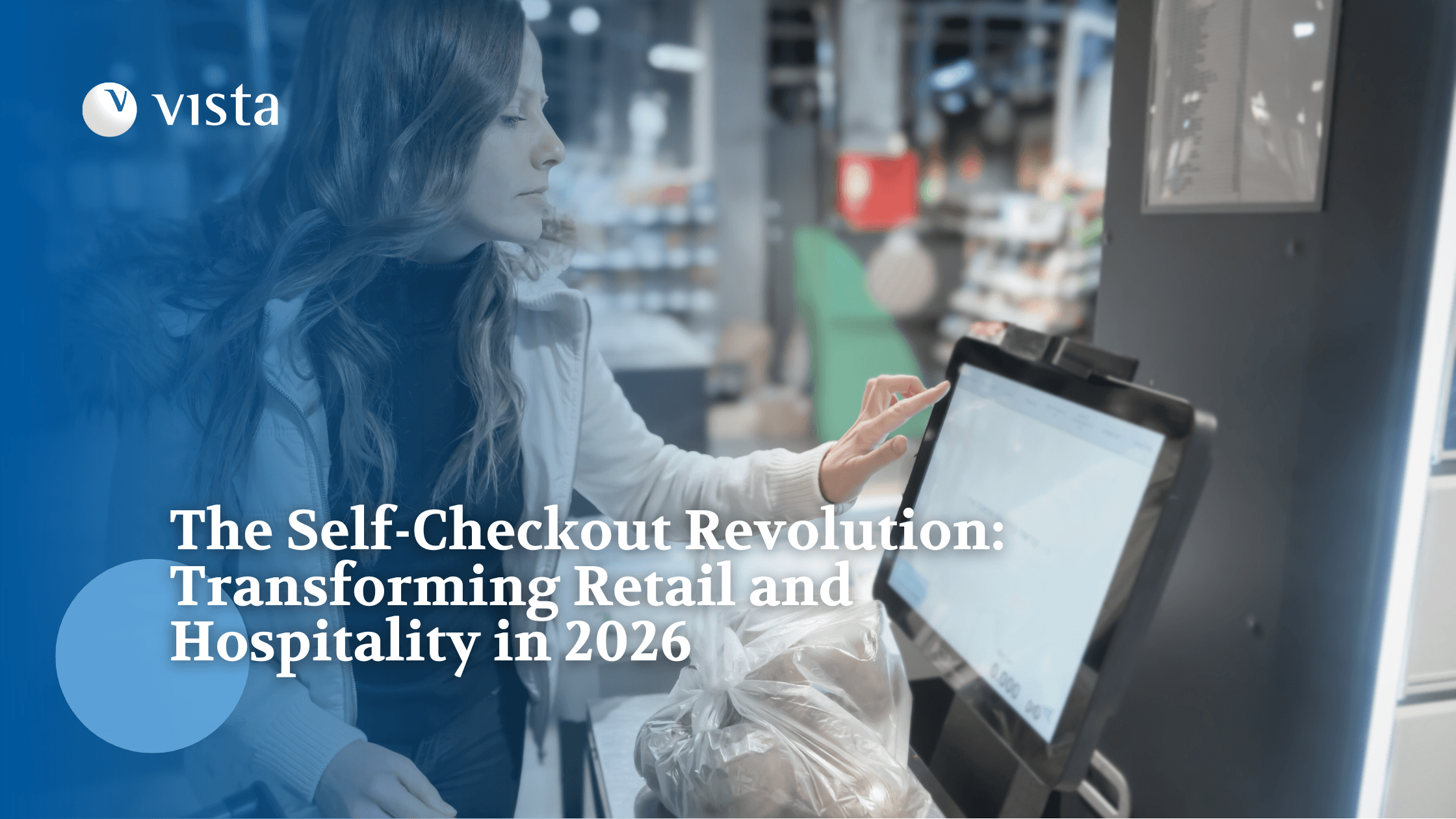Self-checkout and kiosk technology improve retail and hospitality efficiency, reduce operating costs and improve customer satisfaction
Retail and hospitality businesses have experimented with various adaptations of self-service technology in stores, restaurants and cinemas for many years. The benefits of allowing customers to serve themselves can outweigh the potential risk of shrinkage i.e. theft.
The global pandemic which started in 2020 forced businesses to embrace technological change at a breakneck speed, as retail and hospitality businesses faced the real risk of corporate failure if they failed to adapt initially to the restricted ways of trading enforced by local governments. This was evidenced by the change in shopper behaviours such as a huge shift to online, click and collect and self-service. Whilst post pandemic consumer trends have shown a shift back to shopping in-store and dining in restaurants, the desire for consumers to serve themselves in some respects has remained.
The post pandemic recruitment challenges and escalating people costs experienced in retail and hospitality have also opened the door for these businesses to invest further in self-service technology and put the ability to order or pay for goods and food in the hands of the consumer.
Self-service technology comes in a variety of forms, including hand held devices, kiosks and self-checkout (SCO).
Businesses need to make the most of their assets, and IT and EPoS are no exception. Companies within the retail and hospitality sectors need to ensure that they are getting maximum value for money from self-service technology investments and they also need to show that the customer experience doesn’t become affected by technology failure.
Some customers will walk away from a sale if the self-service kiosk or checkout is not working correctly or they have to wait for a colleague to assist them. A major reason for consumer dissatisfaction is often due to the technology not working or the embarrassment of having to wait for a colleague to assist them.
Self-service technology has become the main transaction point within many retail and hospitality environments and as a result it’s imperative that these systems are well maintained.
How to install SCO and self-service kiosk equipment
Expert installation of SCO technology is extremely important. SCO and kiosk technology is often heavy and as it’s sited in consumer facing environments it has to withstand a greater range of environmental challenges such as being vandalised, misused or accidental damage. In such situations, it can then become a health and safety risk to members of the public. Therefore, professional electrical installation and expert installation which considers SCO anchors, fixing points and weight distribution are all to be considered. Where SCO technology has integrated scales, calibration should also be factoring in when installing new SCOs.
Need assistance installing self-checkout (SCO) or self-service kiosks in your stores or restaurants? Visit our IT Project Services Page for more information.
Power and data cabling for self-checkout SCO and kiosk systems
Poor electrical and network data cabling can also impact instore or restaurant colleagues’ working day and also impact the customer experience. Power fluctuations and network interference can cause issues with the reliability of the self-checkout or kiosk systems, corrupt software and dramatically reduce the life span of these technology investments. Vista has over 25 years’ experience in managing a range of power and network cabling projects for some of the most well- known brands in retail and hospitality. For further information, please visit our Infrastructure Project Services Page.
How to maintain self-checkout or self-service kiosk equipment
Retailers, restaurateurs and cinema operators can help maintain their SCO and kiosk systems by following manufacturers’ guidelines with regard to cleaning, such as cleaning touch screens and chip and pin devices, note and coin readers, removing debris and dust from printers. They need to ensure that there are no exposed wires and connecting cables as these do not only pose a health and safety risk but might get caught or snagged.
Self-checkout and self-service kiosk maintenance
Preventative SCO and kiosk maintenance is an option to consider. Self-service technology by its design is used by consumers and therefore it is often mistreated. The internal peripheral devices are protected within the frame of the self-service technology but these may attract dust and debris similar to EPoS systems. Self-checkout systems with integral scales in convenience and grocery settings will also require regular cleaning of scanner lens glass and the scales themselves. Visit our Maintenance & Break-Fix Services Page for more information.
Onsite self-checkout and self-service kiosk maintenance (break-fix)
When SCO or self-service kiosk systems have genuine hardware faults or software faults, it is key that retailers and restaurateurs have a maintenance contract in place.
As the need to resolve SCO and self-service kiosk systems’ faults promptly becomes critical to the success of retail and hospitality businesses, by prolonging the life of the existing SCO investment and with the tightening of corporate purse strings, the need to have a dedicated partner who understands the importance of SCO and kiosk support is essential.
Keeping self-service technology downtime to a minimum
 Businesses should look to work with a support partner who can look after the existing self-service technology infrastructure, but also, when the time is right, advise on new technology, plan and implement future rollouts and is able to maintain mixed product estates.
Businesses should look to work with a support partner who can look after the existing self-service technology infrastructure, but also, when the time is right, advise on new technology, plan and implement future rollouts and is able to maintain mixed product estates.
The cost to a business of having a self-checkout or kiosk system down varies dramatically depending on the circumstances of each organisation. For example, if a large corporation has one SCO or kiosk down it may be an irritant, the business can still trade and the customer experience isn’t greatly affected.
However for a company with a limited number of SCO and EPoS systems, the cost of not having a functioning SCO or kiosk working can be catastrophic. Not only do customers not make purchases on the day but often they will never return.
By working with an expert, retail and hospitality businesses can ensure that self-service technology downtime is kept to a minimum by regularly having the technology serviced, ergo reducing the risk of system failure.
A reliable self-service system will leave staff free to concentrate on customer focused activities. It will also enable businesses to reduce waiting times and ensure customers are served quicker and more efficiently. This ability to offer customers a better service experience could be a differentiator in this increasingly competitive environment.
To understand how Vista can support your self-service technology, please visit our Maintenance & Break-Fix Services Page or contact one of our experts on 0330 135 5795 or email sales@vistasupport.com.



